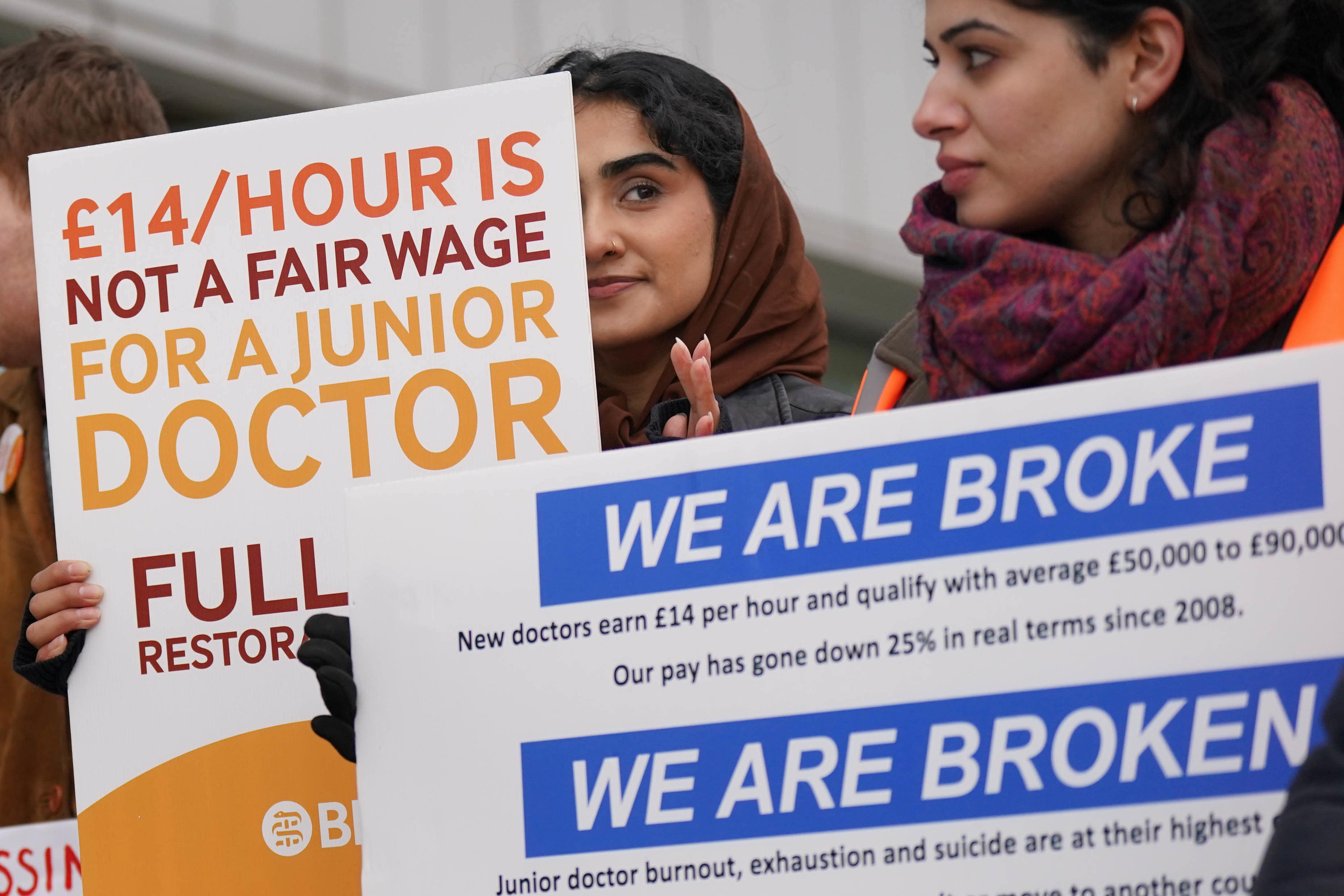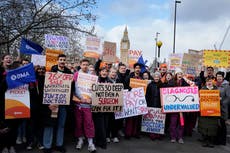Revealed: Junior doctors’ strikes could cost NHS £92 million, leaked figures show
Exclusive: Covering junior doctors shifts during the strikes could cost NHS millions
The three-day junior doctors’ strikes could cost the NHS more than £90m, leaked figures show.
Internal estimates from the NHS and Department for Health and Social Care suggest the cost of covering junior doctors’ shifts with consultants this week is between £66m to £92m, The Independent understands.
The projection is based on a need to cover an estimated 25,000 striking doctors a day at the British Medical Association’s minimum pay rate of between £158 and £262 per hour – depending on whether they work day or night shifts – during this week’s walkout.
According to reports last year, the NHS spent £3bn on agency fees for nurses and doctors, equating to around £57m a week.
It comes after the government and the NHS Staff Council – representing nurses, ambulance staff and other NHS workers – reached a final pay offer after nearly two weeks of talks and months of strikes. The offer covers all NHS staff except doctors, who are on a different contract.
Health secretary Steve Barclay has called on junior doctors to follow the example of other health unions which have settled with the government and call off their industrial action and enter into talks on pay.
He said, “We have offered the same terms to the junior doctors that were accepted by the other trade unions and that is what I hope the junior doctors will respond to,” he said.
“But a request from them for a pay rise of 35 per cent is not affordable. That is why we need to see from them the same sort of leadership that we have seen from the trade unions in the Agenda for Change contract.”
Tens of thousands of junior doctors are estimated to have taken part in strikes earlier this week in what the NHS has said has been the “most disruptive” action yet.
The British Medical Association is calling for the government to address a 26 per cent real terms cut in the average doctor’s pay since 2008. This would equate to a pay increase from £14 per hour to £19 per hour, according to the BMA. Full Fact claims junior doctors’ pay is around £20 to £30 per hour.
While demand on hospitals decreased during the nurses’ strikes, multiple hospitals said the junior doctors’ strike had coincided with the busiest Monday for A&E departments so far this year.
One NHS chief said: “We are hanging on. We came in this morning to a significant post-weekend hangover and it’s very tough – one in one out.”
Matthew Taylor, chief executive of the NHS Confederation, said on the pressures: “For the sake of their patients and staff, health leaders will be glad the junior doctors’ strikes will be over shortly and hope that they never happen again. To guarantee this, the government and BMA need to find a way to move beyond their impasse, otherwise, thousands more cancelled operations and appointments will be on their hands.”
He said services, particularly emergency care, had been extremely busy during the strikes and warned trusts didn’t expect that to change just yet.
“They expect this disruption to continue for the rest of the week, while also facing the huge task of having to rebook all patients whose appointments and elective procedures had to be cancelled. This is particularly daunting when many services will find themselves responding to industrial action again on Monday when many ambulance workers go on strike,” Mr Taylor said.

Speaking about difficulties in negotiating consultant pay during the walkouts, one senior executive told The Independent their trust had been forced to match the BMA’s rates in line with other hospitals in the region.
On Friday, The Independent revealed a further escalation in the impact of the junior doctors’ strikes with hospitals warning for the first time that they would not be able to carry out lifesaving operations and urgent cancer care.
The latest action follows strikes by nurses and ambulance workers this year, during which more than 140,000 operations and appointments were postponed.
In February, The Independent revealed that the NHS was set to miss a flagship government target to eliminate the number of people waiting for more than 78 weeks for care by the end of March, due to strike disruption.
In response to the failure to announce any additional funding to the NHS in the Spring Budget, NHS Providers chief Sir Julian Hartley, who represents those who provide care, said: “As the service faces disruptive strike action due to widespread dissatisfaction with pay and conditions, record care backlogs and significant staff shortages, we know pensions reform is only one part of the puzzle.
“It was disappointing that the chancellor didn’t announce further detail on the long-awaited fully funded, long-term national workforce plan which the NHS so desperately needs.”
The Department for Health and Social Care and NHS England was approached for comment.
This article was amended on March 17 2023. It originally stated the BMA was calling for a pay rise ‘of £14 to £19 an hour’, but should have read ‘from £14 to £19’. We also removed references to basic pay, as the Full Fact analysis did not refer to basic pay alone.
Join our commenting forum
Join thought-provoking conversations, follow other Independent readers and see their replies
Comments


Bookmark popover
Removed from bookmarks